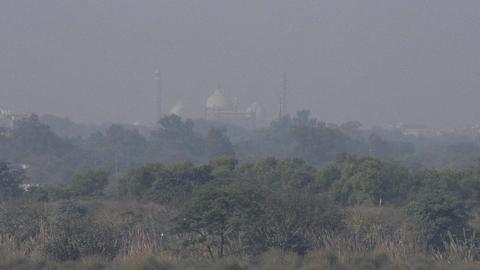
File Pic
A thin layer of smog has once again engulfed parts of Delhi on Tuesday, with the air quality index (AQI) continuing to fall within the 'poor' category. As of 8 am, data from the Central Pollution Control Board (CPCB) reported the overall AQI of Delhi at 274, signifying a significant drop in air quality.
Visuals from key locations across the capital, including Akshardham Temple, ITO, Anand Vihar, and the Delhi-Noida Direct Flyway, revealed a thick haze that reduced visibility throughout these areas. According to CPCB data, specific areas reported even higher AQI readings, with Anand Vihar registering an AQI of 294, ITO at 235, IGI Airport (T3) at 256, and Chandani Chowk and Jawaharlal Nehru Stadium at 250. Other regions like Okhla Phase-2, Punjabi Bagh, and Wazirpur reported AQI values of 277, 298, and 298, respectively, all categorised as 'poor'.
The AQI is classified on a scale ranging from 0 to 500, with values between 0 and 50 considered 'good', 51 to 100 'satisfactory', 101 to 200 'moderate', 201 to 300 'poor', 301 to 400 'very poor', and 401 to 500 'severe'. With Delhi's AQI in the 'poor' category, the city's residents are once again facing the adverse effects of air pollution, which poses significant health risks, particularly for vulnerable groups such as children, the elderly, and individuals with respiratory conditions.
On Monday, the Supreme Court of India refused to relax the Graded Response Action Plan (GRAP)-IV measures aimed at curbing air pollution in Delhi. The court noted that it would only consider relaxations if there was a noticeable downward trend in the AQI. The top court has scheduled a hearing for Thursday to discuss potential modifications to the applicability of GRAP-IV.
As per ANI reports, the Supreme Court also expressed concern over the lack of coordination among various authorities involved in tackling air pollution. It directed the Chief Secretaries of Delhi, Rajasthan, Haryana, and Uttar Pradesh to attend the next hearing virtually. The court emphasised the need for better communication and coordinated efforts among the Municipal Corporation of Delhi (MCD), Delhi Police, Delhi Pollution Control Committee (DPCC), and other relevant authorities.
The court also addressed issues regarding the protection of court commissioners and directed Delhi Police to ensure their safety during the execution of their duties.
The situation highlights the ongoing challenges Delhi faces in combating air pollution, with no immediate solutions in sight, despite efforts to address the issue through GRAP measures. The Supreme Court's decision to maintain the current restrictions underscores the urgency of improving air quality in the national capital.
(With inputs from ANI)